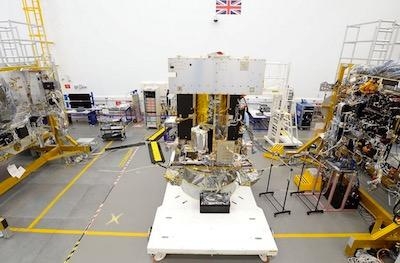Fri, Aug 25, 2017
Will Occur In July, 2019 Over The Pacific Ocean And South America
The solar eclipse visible Monday across the U.S. provided a spectacular view of the mysterious solar corona, the one million degree “halo” around the sun, which can only be seen from Earth when the Moon passes in front of the bright solar disk, which otherwise completely drowns out the faint light of the corona.

Scientists lucky enough to be able to see the Solar Eclipse from Earth studied this rare glimpse of the corona during the one hundred and sixty seconds or less that the eclipse lasted to try to answer the many unanswered questions about this mysterious corona. No one yet knows for instance, why the corona is more than 100 times hotter than the surface of the Sun.
Meanwhile the ESA spacecraft Solar Orbiter is in the final stages of spacecraft integration at the Airbus spacecraft assembly hall in Stevenage, U.K.
Solar Orbiter will be launched in February 2019 into a close orbit around the Sun and will allow scientists to study the solar corona in much more detail, for much longer periods, and at a much closer distance that can ever be reached here on the ground, or for that matter, by any spacecraft circling the Earth. Ten instruments will be flown that will study not only the corona but the Sun’s disk in great detail, the solar wind and the solar magnetic fields which will give us unprecedented insight into how our star works, and how we can better predict periods of stormy “space-weather” that the Sun throws our way from time to time.
The last of the ten instruments is being installed this month and the next step is system testing before the heatshield, antennas and boom are added towards the end of the year. In addition, the first instrument end-to-end electrical test has been performed successfully showing that the system works completely as expected.
By the time of the next global total eclipse, across the Pacific Ocean and South America on 2nd July 2019, Solar Orbiter will have begun its three and a half year journey to the inner solar system to get close to our Sun.
(Image provided with Airbus news release)
More News
Airport Rotating Beacon A visual NAVAID operated at many airports. At civil airports, alternating white and green flashes indicate the location of the airport. At military airports>[...]
Aero Linx: Fly for the Culture Fly For the Culture, Inc. is a 501(c)(3) non-profit organization that serves young people interested in pursuing professions in the aviation industry>[...]
Klyde Is Having Some Issues Comprehending The Fed's Priorities FMI: www.klydemorris.com>[...]
Also: Viasat-uAvionix, UL94 Fuel Investigation, AF Materiel Command, NTSB Safety Alert Norges Luftsportforbund chose Aura Aero's little 2-seater in electric trim for their next gli>[...]
Also: EP Systems' Battery, Boeing SAF, Repeat TBM 960 Order, Japan Coast Guard H225 Buy Despite nearly 100 complaints totaling millions of dollars of potential fraud, combined with>[...]
 ANN's Daily Aero-Term (04.25.24): Airport Rotating Beacon
ANN's Daily Aero-Term (04.25.24): Airport Rotating Beacon ANN's Daily Aero-Linx (04.25.24)
ANN's Daily Aero-Linx (04.25.24) Klyde Morris (04.22.24)
Klyde Morris (04.22.24) Airborne 04.24.24: INTEGRAL E, Elixir USA, M700 RVSM
Airborne 04.24.24: INTEGRAL E, Elixir USA, M700 RVSM Airborne 04.22.24: Rotor X Worsens, Airport Fees 4 FNB?, USMC Drone Pilot
Airborne 04.22.24: Rotor X Worsens, Airport Fees 4 FNB?, USMC Drone Pilot



